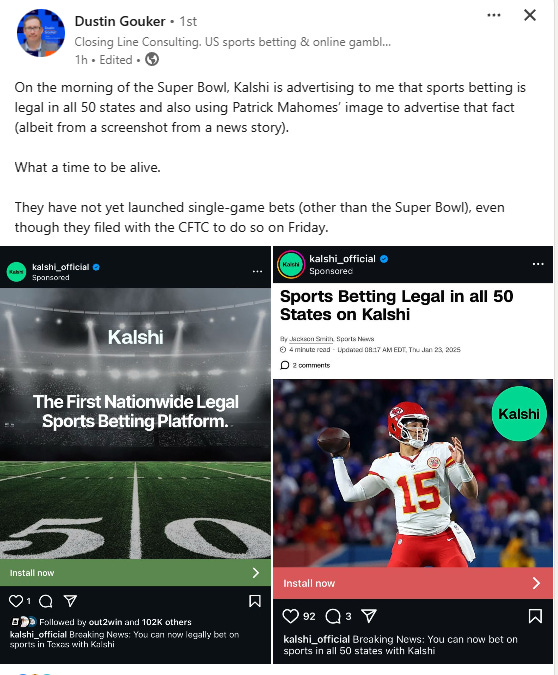Kalshi's Super Bowl Gamble
Kalshi's $27 million Super Bowl trades falls short of the billion-dollar-plus handle of traditional sportsbooks, but their aggressive marketing might be the larger concern.
The Bulletin Board
THE LEDE: Did Kalshi win or lose the Super Bowl?
MIDWEEK ROUNDUP: Tracking tools found in UK gambling sites; PA Gov. proposes hefty tax rate on skill games
NEWS: Mississippi Senate passes legislation prohibiting sweepstakes gaming.
VIEWS: Iowa casino moratorium bill fails; likely killing online casino efforts.
AROUND the WATERCOOLER: Canadian news from Alberta and Manitoba.
STRAY THOUGHTS:
SPONSOR’S MESSAGE - Sporttrade was borne out of the belief that the golden age of sports betting has yet to come. Combining proprietary technology, thoughtful design, and capital markets expertise, our platform endeavors to modernize sports betting for a more equitable, responsible, and accessible future.
Sporttrade is now live in their fifth state; Virginia
The Lede: Kalshi’s Super Bowl Successes and Missteps(?)
$27 million. That was the amount wagered on Kalshi for the Super Bowl, and a pretty good number considering the nascency of prediction markets in the US and sports markets in particular.
The company informed the CFTC that it is “self-certifying contracts that can be based on single-match outcomes, like who will win an NBA game,” just ahead of the Super Bowl — Dustin Gouker’s Event Horizon newsletter has more details on the Kalshi filing with the CFTC.
As Kalshi CEO Tarek Mansour noted on X, a Super Bowl push resulted in the Kalshi app ranking in the Top ten of the Finance App rankings. Notably, the app appears as “Kalshi: Bet on the headlines.” Mansour also said, “Stay tuned for a big announcement this week.”
However, Kalshi’s Super Bowl betting numbers are a bit meh compared to the roughly $1.5 billion expected to be wagered through licensed sportsbooks and the multiples of more than that bet illegally and at unlicensed sites.
FanDuel alone reported 3 million customers placed more than 16.6 million Super Bowl bets, peaking at nearly 70,000 bets per minute.
As I’ve said, I’m not sure the current product is an actual competitor to sportsbooks, as the offerings are limited, and the UX simply isn’t on par — at least not yet.
My bigger concern is the constant “big announcements,” the “Bet on the headlines” tagline for its app, or the usage of “betting” or calling itself a “sports betting platform” (h/t Dustin Gouker) in sponsored social media posts, is going to draw the kind of attention the company wants.
As Ollie Ring said in his Esprouts Newsletter on the sponsored ads:
“The old adage goes, “Give them an inch, and they’ll take a mile.” Kalshi seems almost hell-bent on forcing regulatory change (perhaps even at the federal level) to address its activity. Until it happens, though, there’s no doubt they’ll keep chancing their arm.”
Or, as I said in my recent feature column on prediction markets:
“I am not opposed to any new product or model. Whether it’s a traditional online poker site, a sweepstakes casino, or a prediction market site offering sports contracts, I simply want a safe, regulated environment where the rules are made plain. That means proper AML/KYC, integrity, responsible gaming, and consumer protections are in place, with oversight ensured.
“[…]
“Most companies in this space, licensed or not, would tell you the smart play is to stay off the regulatory radar.
Against the backdrop of the CFTC requesting Crypto.com and Robinhood to take down sports-related markets (and as Dustin Gouker reported in the Event Horizon Substack, Robinhood quietly scrubbing its press release about teaming up with Kalshi), Kalshi continues to push the envelope.”
Midweek Roundup: Tracking Tools in UK Gambling Sites; PA Gov. Proposes Skill Games Tax Rate
Hidden tracking tools in UK gambling sites raise concerns: “Gambling companies are covertly tracking visitors to their websites and sending their data to Facebook’s parent company without consent in an apparent breach of data protection laws,” per a report in the Guardian. According to the article, a hidden tracking tool was embedded in dozens of UK gambling websites and sending user data, “including details of the webpages they view and the buttons they click.” Of 150 websites tested by the Observer, 52 shared data automatically via the Meta Pixel tracking tool without explicit consent, resulting in the tester being “bombarded with Facebook ads for gambling websites… In a single browsing session, they were shown gambling ads from 49 brands.”
PA Gov. proposes regulating skill games with a very high tax rate: Pennsylvania Gov. Josh Shapiro has proposed regulating skill games in the state, something the suppliers have requested for years. Per Play PA, the proposal would allow 30,000 total combined VGTs and skill game machines in establishments in 2025-26, increasing incrementally to 40,000 machines by 2029-30, with no more than five per location. What they haven’t been asking for is the 52% tax rate Shapiro proposed — the rate aligns with the state’s tax on slot machines at casinos, currently set at 54%. One skill game operator, Jordan Scanlon, told TribLive.com, “It would kill all of us. We would never be able to stay open. If it was 10% or 15%, that would be reasonable.”
News: Mississippi Senate Passes Bill Banning Sweepstakes
As noted yesterday, three states have introduced bills prohibiting sweepstakes gaming sites from operating within their borders: Connecticut, Maryland, and Mississippi.
Mississippi: SB 2510, introduced by Mississippi State Sen. Joey Fillingane.
Maryland: SB 860, introduced by State Sen. Paul Corderman, and HB 1140, sponsored by Del. Eric Ebersole.
Connecticut: SB 1235, introduced by the General Law Committee.
Connecticut’s bill has a hearing scheduled on Friday, and Maryland’s bills have hearings scheduled for March 5 and 6.
However, the most significant news is in Mississippi, where the Senate passed a substitute version of SB 2510 in a 44-1 vote (h/t Daniel Wallach).
Per Wallach:
“At first glance, most of the main elements of the original bill appear to be part of the committee substitute. Per SB 2510, each violation would be a felony, subject to a $100,000 fine, up to 10 years in jail, and a forfeiture of assets. Crucially, the criminal penalties apply to both operators and promoters of online sweepstakes casino websites.”
As Wallach also noted, a motion to reconsider was filed (essentially bringing the bill back for a second vote). No reason was given, but given the 44-1 vote, I don’t expect much to change.
Also lurking in the background:
Sweepstakes sites have received cease-and-desist letters in Michigan, Delaware, and Washington.
West Virginia Attorney General JB McCuskey sent subpoenas to sweepstake operators (h/t Casino Reports).
Arizona issued a PSA before the Super Bowl cautioning residents about “illegal” gaming sites, including sweepstakes.
A bill in New Jersey would require sweepstakes sites to apply for gaming licenses.
New York’s online casino bill would bar currently active sweepstakes sites from receiving a gaming license.
For anyone trying to stay current on the rapidly changing sweepstakes landscape, I highly recommend the recently launched Sweepsy.com, which offers balanced coverage (it is an affiliate site).
SPONSOR’S MESSAGE - Underdog: the most innovative company in sports gaming.
At Underdog we use our own tech stack to create the industry’s most popular games, designing products specifically for the American sports fan.
Join us as we build the future of sports gaming.
Visit: https://underdogfantasy.com/careers
News: Iowa Casino Greenlit After Moratorium Effort Fails
After being fast-tracked in the Iowa House, a five-year casino moratorium died in the Senate, setting the stage for a new casino in Cedar Rapids. The bill’s failure likely killed online casino efforts in 2025.
Per local press, “State Senator Ken Rozenboom wrote in his newsletter this week that he decided to ultimately halt moving a bill that would have placed a five-year moratorium on casinos in Iowa ahead of the Iowa Racing and Gaming Commission’s approval of a new facility in Cedar Rapids.”
Rozenboom said that while he is not a fan of gambling, the Senate did not support renewing the state’s moratorium on new casinos, which expired in July.
The moratorium heavily impacts Iowa’s online casino efforts.
As previously noted, “Iowa Gaming Association President Wes Ehrecke told Play USA, “The IGA’s focus next session will be on extending a moratorium on any new casino licenses, and all the gaming companies are unified to support this effort. If there is a successful outcome to extending the moratorium, then members can assess if and when there will ever be unified support to advance iGaming.”
Around the Watercooler
Social media conversations, rumors, and gossip.
News from the North.
Alberta’s regulated online gambling industry is suffering from a slowdown, with a launch unlikely until late 2025, at the earliest, per Mark Keast:
And in Manitoba, the Manitoba Liquor & Lotteries (MBLL) has filed an injunction against Bodog (Bovada). Keast spoke to CLC Executive Director Will Hill (just a coincidence), who said hundreds of millions of dollars are being lost to illegal operators. The injunction is the first of its kind.
“According to CBC reporting, the court application argues Bodog promotes its platforms via misleading statements, presenting itself as lawful and safe, which it isn’t. Twice CLC has asked Bodog to take its site down, but it has refused.”
As Covers.com noted, the company abruptly left the province of Nova Scotia in October “with little clarity as to what caused the move. There was speculation about the province restricting offshore gambling markets.”
Stray Thoughts
One thing I’ve learned as a martial arts instructor is to separate the syllabus from the curriculum.
The curriculum is the complete educational framework and content for a martial arts school. It covers every drill, technique, principle, and idea. The syllabus outlines the specific techniques, skills, or knowledge students are expected to learn as part of that curriculum.
In my experience in the gambling space, many people mistakenly think the syllabus is the curriculum. They focus on the basic rules or strategies (the syllabus) and believe that's all there is to know, not realizing there's a much broader, more complex system (the curriculum) behind the scenes.
More bluntly, surface-level knowledge (syllabus) is often mistaken for comprehensive understanding (curriculum).








